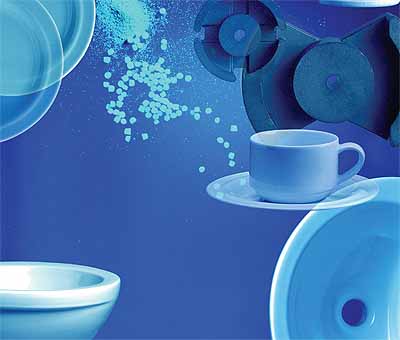Riedhammer
Superb ceramics from Riedhammer
Operating from a headquarters in Nuremberg, Germany, Riedhammer is the leading manufacturer of kiln plants worldwide.
Alongside its traditional business areas of ceramics and sanitary ware, the company also offers new and innovative technologies for the steel and electronics industries.
The organisation actually dates back to 1924, when Ludwig Riedhammer, an engineer resident in Nuremberg, decided to start his own company – his goal was the development and construction of industrial furnaces for manufactured carbon. At this time, the aluminium and steel industries were growing rapidly, and large quantities of anodes made out of graphite were required, which could only be manufactured by means of special baking processes. As a result, the pit furnaces developed by Riedhammer were soon accepted throughout the world, and have been the basis for the success of the company.
To find out more about the company’s development over the last 80 years, Manufacturing Today Europe spoke to Wolfgang Dörr, business manager for the Technical Ceramic branch of the Riedhammer organisation. “As the company was evolving, the first kilns for technical ceramics (electronic components) were developed with longlasting co-operation agreements especially with Japanese customers,” he begins.
“In the 1940s Riedhammer started to also move into fine ceramics, such as tableware and sanitary ware. Over the following decades the market for electronic components continued to grow, and Riedhammer started exporting kiln plants all over the world. In the last two decades of the 20th century Riedhammer further developed into firing technologies, e.g. the fast firing technology for hard porcelain and special plants for the treatment of hard and soft ferrites, an essential material for the electronics industry.”
In 2003, Riedhammer experienced a significant milestone in its history when the Italian SACMI Group acquired 30 per cent of the company, increasing its shareholding to 90 per cent in 2004. SACMI is an international group manufacturing machines and complete plants for the ceramics, beverage & packaging, processing and plastics industries – markets in which it is a recognised worldwide leader.
The acquisition of Laeis, also in 2004, meant the kiln designs of Kerabedarf and Heimsoth were integrated into the Riedhammer business. The subsequent restructuring process saw manufacturing in Nuremberg end, but total engineering capacity concentrated in the city. In 2005 Riedhammer built upon this by acquiring ‘open top’ technology for the baking of Anodes from Alesa, which enabled the company to become the only independent supplier providing technology for the baking of Anodes worldwide.
Becoming part of the much larger SACMI Group has had a positive effect on Riedhammer’s business, as Wolfgang explains: “Of course, as the SACMI group covers the entire range of machinery for the ceramic industry, our knowledge of the whole production process increased a lot and we are now able to develop innovations which take all the needs of our customers into consideration, including all the necessary interfaces.”
As a result, Riedhammer has been able to continually improve and update its product offering over the last three years, bringing a range of new solutions to its respective markets.
An example of this increased focus on innovation came in June 2007 when SACMI launched its new TEAM brand. Standing for ‘Technology and Experience for Advanced Materials’, in the field of technical ceramics, this initiative is bringing together the skills and technologies of Sacmi Imola, Riedhammer, Laeis, Sama and Gaiotto to offer solutions for ceramic production plants. “TEAM holds special competences in body preparation, shaping, surface treatment, heat treatment, mechanical finishing and automation. By being part of TEAM, Riedhammer is strengthening its leadership and activities in the markets by using synergies,” comments Wolfgang.
These kinds of developments are clearly hugely benefiting Riedhammer. In each of its market areas the company can boast an impressive list of customers from across the world. For example, within Technical Ceramics, Riedhammer works regularly with the likes of Bosch, Siemens, Saint Gobain, TDK and Denso. While in its Manufactured Carbon branch, Venalum and EMAL are amongst its high profile clients.
Looking to the future, Wolfgang and his colleagues at Riedhammer are keen to build on these strong foundations and further grow the business. The ongoing strength of the kiln plant market will clearly have an impact on this: “There is a lot of potential in manufactured carbon, ceramic catalysts, diesel particle filters and sanitary ware, and for the time being we feel that these markets will continue to grow over the next years,” he adds. “To address this, we’ve already increased our engineering capacity in the last year and we will continue to optimise our global network together with our sister companies and our mother group SACMI.”
Concluding, Wolfgang describes how he would like to see Riedhammer progress over the next two to three years: “The company is now fully restructured and ready to cope with today’s customer driven market, with all its cost pressures, high delivery expectations and after-sale service requirements.
“We wish to further gain our customers trust with a market-based product portfolio, and good balance of performance, price, quality and innovation. As our competitors are more aggressive than ever and customers therefore have more choice, we need to give full attention to our clients and keep the promises that we make.”
Riedhammer
Products: Kiln plants
Sites: Nuremberg
Employees: 150 at HQ
www.riedhammer.de
